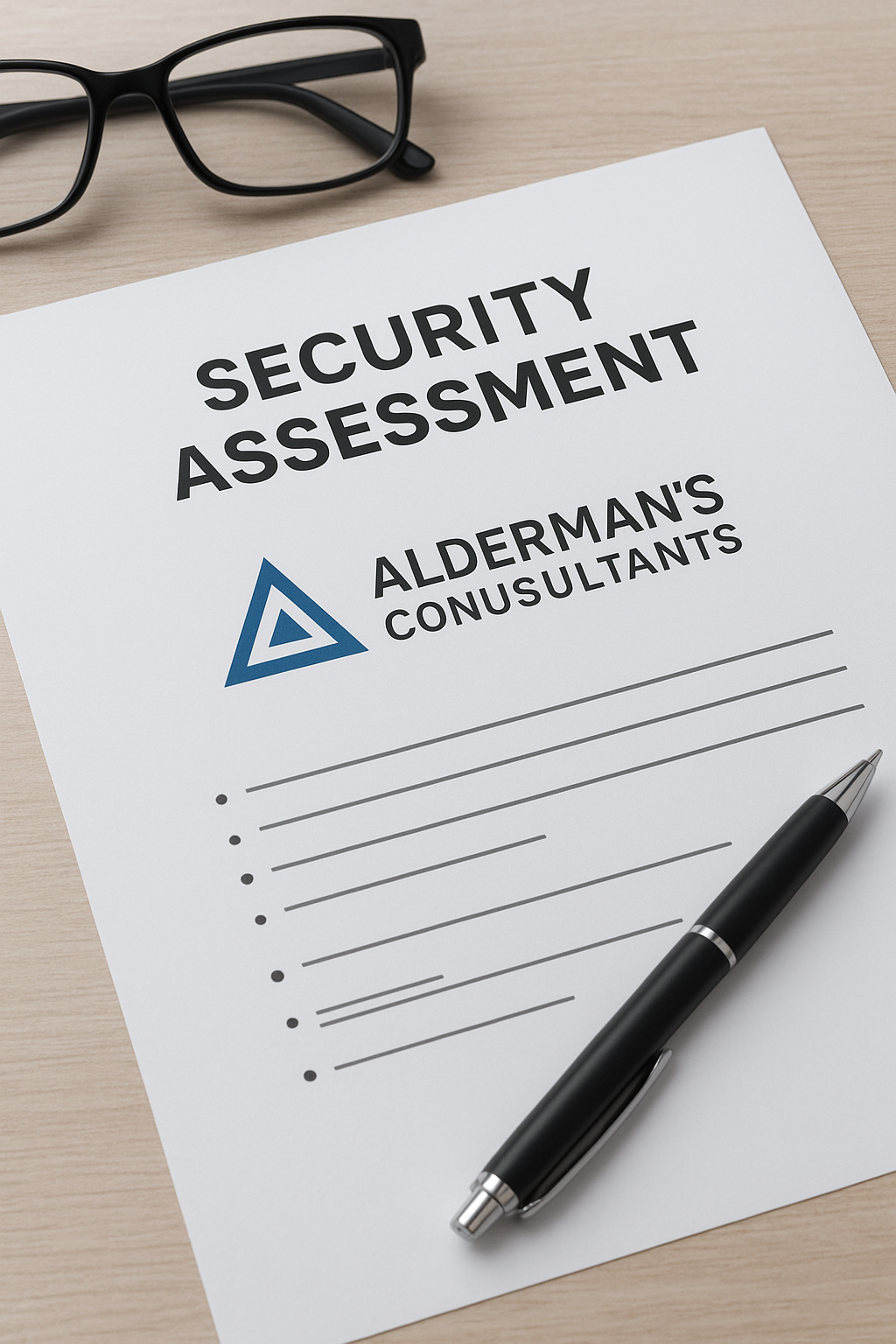At Aldermans Consultants, we outline the importance of conducting a comprehensive security assessment for commercial buildings in London.
A security assessment provides a systematic evaluation of existing protective measures, identifies vulnerabilities, and recommends improvements to ensure the safety of personnel, assets, and operations. In the current threat landscape, organisations have both legal and ethical responsibilities to maintain appropriate levels of security and resilience.
Legal and Regulatory Compliance
A formal security assessment plays a critical role in ensuring compliance with UK legislation and regulatory standards. Key requirements include:
-
Health and Safety at Work etc. Act 1974 – Employers must provide a safe environment for staff and visitors, including protection from foreseeable security risks.
-
Regulatory Reform (Fire Safety) Order 2005 and subsequent guidance – Adequate access control, emergency procedures, and safety systems must be in place.
-
Data protection legislation, including GDPR – Physical security forms part of the requirement to protect personal and sensitive data.
-
Insurance conditions – Many commercial insurers stipulate minimum security measures (locks, alarms, CCTV, monitoring). Failure to meet these requirements can result in invalidated policies.
Conducting a security assessment ensures the building meets statutory obligations and aligns with industry standards such as BSI specifications and national policing guidelines.
Protection of People, Property, and Operations
A security assessment identifies threats that could compromise the safety and wellbeing of building occupants. It evaluates risks relating to:
-
Unauthorised access
-
Theft and vandalism
-
Workplace violence
-
Sabotage or insider threat
-
Damage to high-value equipment and sensitive information
By analysing these risks, organisations can implement suitable measures to safeguard human life, maintain productivity, and preserve essential business operations.
Risk Reduction and Cost Management
Security incidents can have significant financial consequences, including theft-related losses, operational disruption, litigation costs, and reputational damage. A structured assessment allows an organisation to:
-
Identify vulnerabilities before they are exploited
-
Prioritise cost-effective security improvements
-
Reduce insurance premiums
-
Demonstrate due diligence in the event of an incident
Proactive risk management ultimately minimises long-term financial exposure and supports organisational resilience.
Tailored and Site-Specific Security Planning
Every commercial building is subject to unique environmental and operational factors, such as:
-
Location and local crime trends
-
Building size, layout, and access points
-
Nature of business operations
-
Volume of staff, visitors, and contractors
-
Presence of high-value or sensitive assets
A security assessment ensures that protective measures are appropriate for the specific risks associated with the site, rather than relying on generic or unsuitable solutions.
Alignment With Best Practice and Security Frameworks
A professional assessment assists organisations in meeting recognised UK security frameworks, including:
-
British Standards (e.g., BS 7499, BS 16000)
-
National Security Inspectorate (NSI) guidelines
-
Security Industry Authority (SIA) best practice
-
Counter Terrorism Security Advisor (CTSA) recommendations for crowded places
Adherence to such frameworks enhances the reliability and credibility of the organisation’s security posture.
Strengthening Organisational Confidence and Culture
Effective security procedures contribute to a positive organisational culture by:
-
Enhancing staff confidence and safety
-
Improving operational efficiency through controlled access and visitor management
-
Reducing internal losses or misconduct
-
Reinforcing the organisation’s duty of care obligations
A well-secured environment supports higher morale and productivity.
Addressing Modern and Emerging Threats
The evolving security landscape requires a forward-looking approach. A comprehensive assessment considers contemporary threats such as:
-
Cyber-physical attacks
-
Drone-related intrusions
-
Lone-actor threats
-
Supply chain vulnerabilities
-
Social engineering and tailgating risks
This ensures that the building is protected not only against traditional crime but also against sophisticated modern threats.
Conclusion
A security assessment is an essential element of responsible facility management for commercial buildings in London and the rest of the UK. It ensures compliance with legal obligations, enhances occupant safety, reduces financial and operational risks, and strengthens organisational resilience.
By identifying vulnerabilities and recommending targeted improvements, a physical security assessment provides a robust foundation for maintaining a secure, efficient, and legally compliant commercial environment.
Need A Security Consultant in London?
Aldermans security consultants are recognised as London’s leading independent security advisors, providing expert guidance to commercial and private clients. Our consultancy assesses security risks and gaps, then develops tailored plans to mitigate or eliminate those risks. We support clients across London to ensure their buildings, personnel, and assets are effectively protected. For an impartial physical security review of your estate, site, or building, contact Aldermans Security Consultants today on 0208 191 7313
